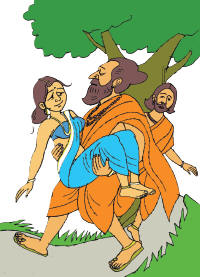TreeInTheSeed05
Sakthi Vikatan-
07 Jan, 2014
Title: Body-Mind-Intellect-Soul.
 We
can study the physical body from these perspectives: Bone, muscle,
nerve, blood, lymph. The body, mouth, eye, nose, and ear fall under the
category of five organs. Because of these organs, we cognize touch,
taste, vision, smell and hearing. The intrinsic power of the two of the
important organs, the brain and the heart, activizes these other organs.
The brain and the heart participate in the formation and modulation of
thoughts and emotions.
We
can study the physical body from these perspectives: Bone, muscle,
nerve, blood, lymph. The body, mouth, eye, nose, and ear fall under the
category of five organs. Because of these organs, we cognize touch,
taste, vision, smell and hearing. The intrinsic power of the two of the
important organs, the brain and the heart, activizes these other organs.
The brain and the heart participate in the formation and modulation of
thoughts and emotions.
Brain’s intellectual ability and thinking faculty are the engine for
genesis of thoughts. Generally, we attribute to the heart qualities such
as platonic or sexual love, happiness, sorrow, anger… We usually say we
hold in the heart someone dear to us. We don’t say we hold him in our
brain. But, from the scientific perspective, the brain is the repository
of desire, passion, anger… We listen to a melodious song. We know the
lines and sing along. We
even recall the background music. We feel the joy. What is behind these
feelings: Brain or the heart? Or the ears, mouth…? Think about it.
If we call brain’s ability as intellect, what is mind? Which part of the
body activizes thought? Are
mind and intellect one or separate? The mind sometimes cooperates when
the organs function. Many other times, the mind is opposed to the
functions of the organs. Is it the mind or intellect the principal
arbitrator of likes, dislikes, desire, affection, feelings, anger, and
fury in human activity? Is it the organ-dependent body, mind, or
intellect that a person should control, when he (or she) thinks of
leading a disciplined life? These questions are raised over many ages.
Religious texts and Tattva Sastras have given answers from many points
of view.
We can state that mind is man’s cultural repository. It is birthplace of
his feelings. When the organs are working, mind registers the feelings.
When the mind desires an object or an experience, the organs cooperate
in obtaining them.
The organs are the slaves of the mind. Sometimes the mind is the slave
of the organs. You can control the mind with intellect or wisdom by
observing non-attachment (to objects or experiences) with absolute
steadfastness. Later, the control of the organs follows in its wake.
Then, serenity and peace prevail.
The tree will grow.
Who has borne the burden?
 The
guru and his disciple were walking along the riverbank, where a
beautiful girl was sitting. She had a leg wound preventing her from
walking.
The
guru and his disciple were walking along the riverbank, where a
beautiful girl was sitting. She had a leg wound preventing her from
walking.
The lass pleaded with the guru, “Swamy, would you please carry and leave
me on the other riverbank?
Not saying one word, he carried her, forded the river and deposited her
on the other bank. The disciple was shocked.
The disciple was roiled in thoughts: “Could a Sannyasi touch a young
girl and carry her? Is it Dharma (proper conduct)? After a while, he
gathered some courage and questioned the guru, “Guru, You touched the
lass and carried her. Should you have done it? Is it Dharma? Is it
justice?”
Guru said, “Hey, I put her down some time ago. You are still carrying
her. At least for now, put her down.”
There was no mental agitation, when one soul carried another soul across
the river to the other shore in the spirit of selfless service. His mind
and feelings agitated the disciple rather than the body parts of the
lass.
